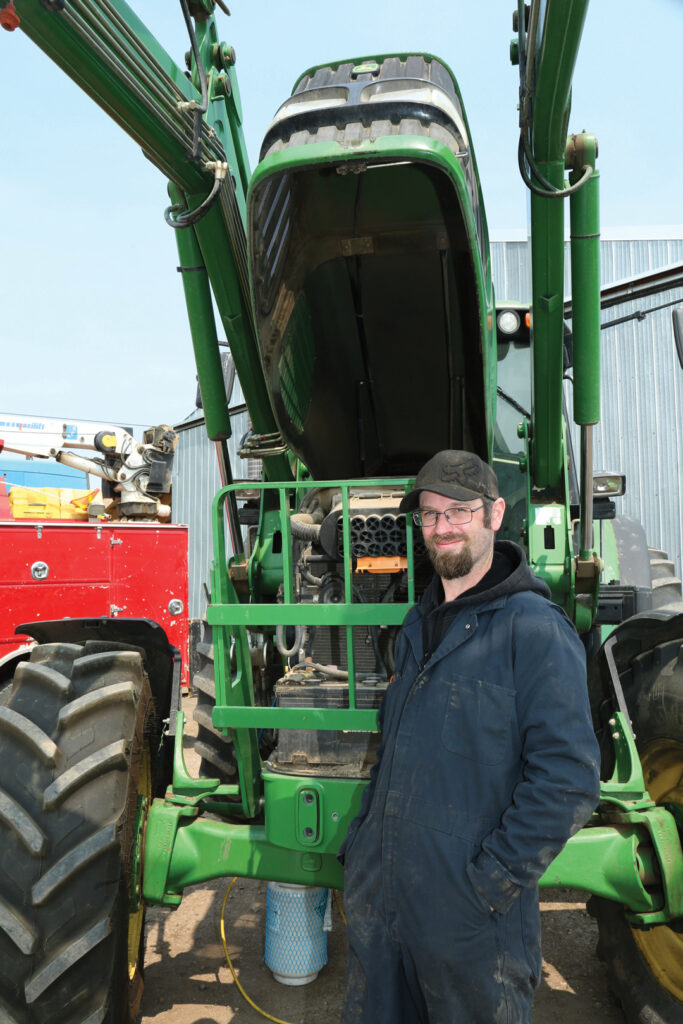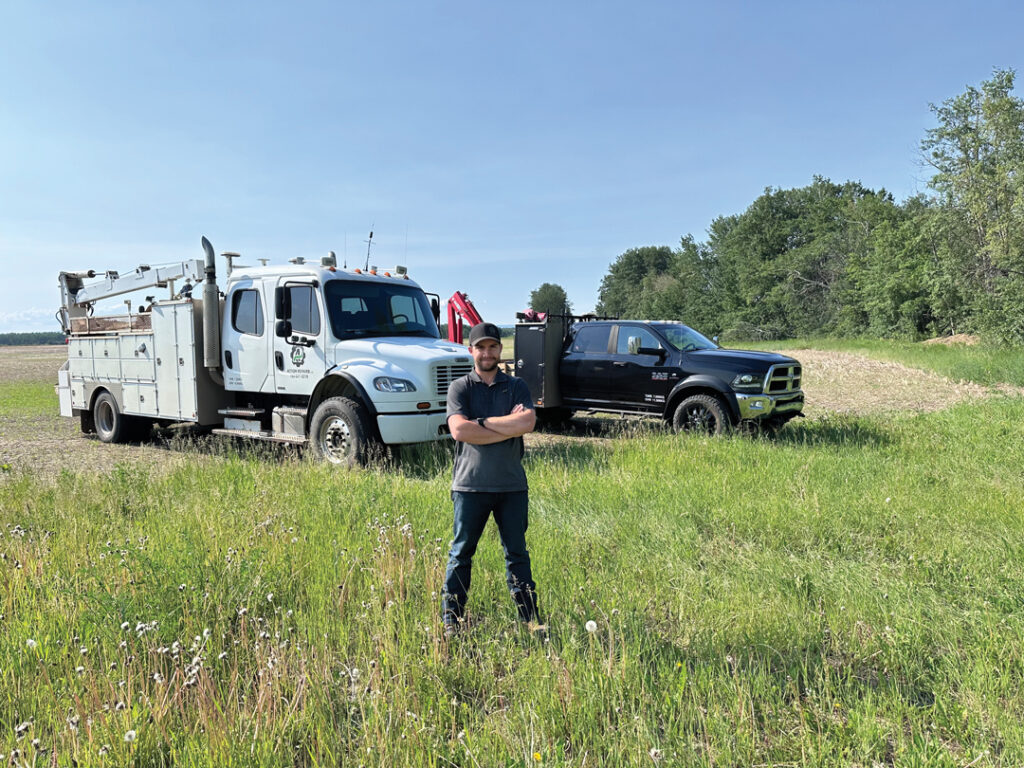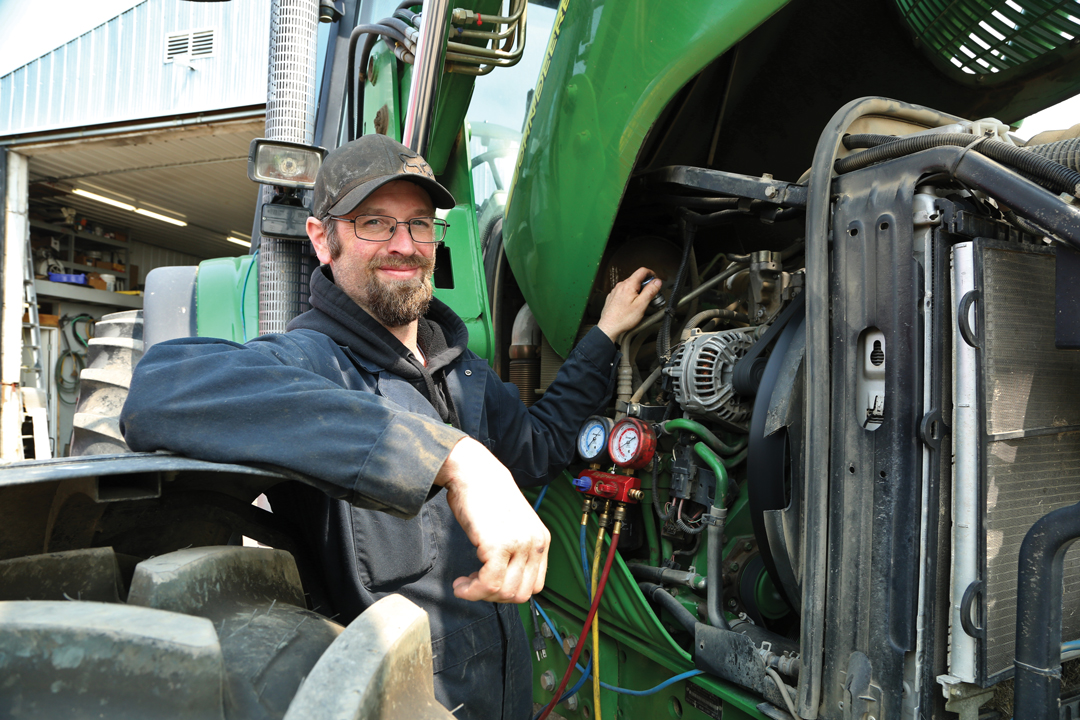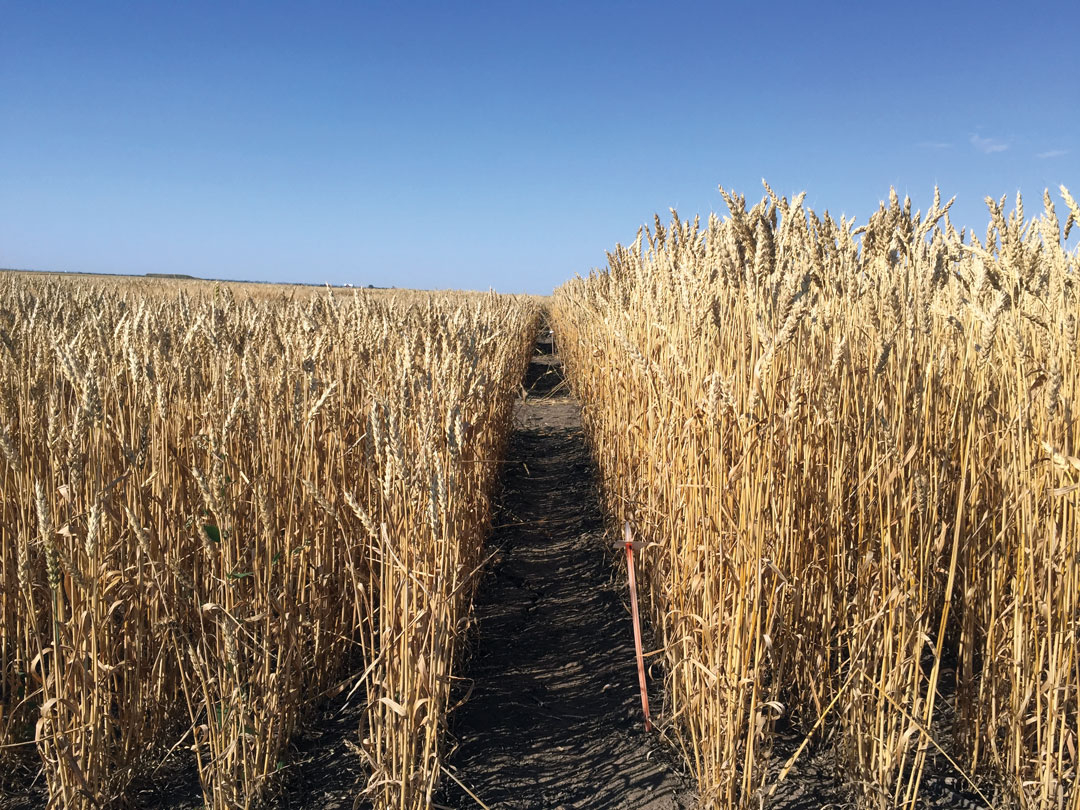THE FIXERS
BY SARAH WEIGUM • PHOTOS BY ZOLTAN VARADI
A few kilometres from the family farm where he grew up, Brad McGhee sits on an old office chair. It is next to a work bench in a shop he slowly modified to support his business as an independent mechanic. Once a cold storage shed with a dirt floor, the metal-clad building is now heated and boasts a cement floor and insulated walls. He also installed roof trusses and carried out additional engineering to qualify for commercial insurance.
When GrainsWest visited his shop, McGhee’s heavy-duty red service truck was backed into the main work bay. On another day, he might, for example, have a front-wheel-assist tractor in for servicing. Outside of the shop, he is constructing a lean-to that will be used as a parking spot for personal vehicles. His house is a stone’s throw from the shop’s entrance.
He and his parents no longer farm, but the property where McGhee lives and works looks much like a typical farmyard. While he described the improvements he’s made to the shop, his partner and one-and-a-half-old son interrupted briefly to say goodbye. They were headed into nearby Drumheller where McGhee completed two years of training as a mechanic at a John Deere equipment dealership.
McGhee has been self-employed since 2017. After working as a dealership mechanic for nine years, he grew frustrated with corporate policies and inefficiencies he perceived in the dealership environment.
Combines are McGhee’s specialty. He conducts inspections and preventative maintenance on 20 to 30 units per year. He also supports the owners of these combines during the harvest season if they need emergency repairs and then takes on miscellaneous projects such as engine overhauls that farmers bring his way. Haying equipment, tractors and sprayers round out a year’s work.
While he does carry out time-sensitive equipment servicing in his shop, he mainly uses it for less urgent jobs. These might include rebuilding engines and transmissions on older, non-critical machinery. Most days, depending on the time of year, McGhee drives the red service truck to jobs in farm fields or his customers’ own shops.
Self-employed for almost eight years, he has no problem finding customers. In fact, he is able to selectively take jobs that fit his business model. He also gravitates toward customers who value mutual respect. “My rule is I like to work for people that I can sit and have a meal with,” he said. “And I am booked six months out.”
Like any good businessperson, McGhee knows he must provide customers with a necessary service at a fair price. When a machine fails beyond a farmer’s mechanical knowledge, the obvious option is to call the appropriate equipment dealership. However, McGhee and his fellow independent mechanics believe they can make farms more efficient. They do this by optimizing their own skill set, but also actively develop the mechanical abilities of their customers.

CUSTOMER RELATIONS
Darcy Penner farms in the Acme area and met McGhee when he worked at a dealership. Penner was impressed with his skills, and when McGhee launched his own business, he hired the independent mechanic when he needed in-season repairs. As Penner’s equipment aged, he also saw the value in having a single mechanic service his combines from year to year.
“It was nice to have the continuity of one person working on your equipment. And the reality is the cost factor played into it, too,” said Penner. Dealership mechanics usually cost him an extra $15-$20 per hour and he has found they are often not as timely. Penner recalled a combine breakdown he experienced during harvest that the dealership told him would take two days to fix and require the combine to spend time in their shop. To Penner’s relief, McGhee and a fellow independent mechanic repaired it in the field the same day.
Penner values the fact he can work alongside McGhee and handle the tasks he is capable of while leaving the more complicated aspects of the job to a trained professional. “He’ll walk me through the different aspects of repairs that need to be done. I’ll do the more mid-range servicing on the combine. That saves me hours of his labour that doesn’t require his expertise.”
Brad Schmidt, a 31-year-old journeyman mechanic, also operates his own business, and he takes a similar approach to working alongside his customers. He works mainly in their shops rather than his own. This saves them road hours on their equipment and helps them learn along the way. “I want to get customers familiarized with their equipment again. I feel that has been lost in the advancement of the equipment,” said Schmidt. “Customers got scared of their equipment once it had sensors and controllers, and guys backed off doing their own repairs.”
Schmidt himself learned on the job, so to speak. “I grew up in Youngstown on a large grain farm. We always had lots of equipment around, and we did a lot of our own maintenance and repairs,” he said. “I was always interested in the mechanical side of things.”
After high school, Schmidt trained as a heavy-duty mechanic at NAIT in Edmonton. Now, based in La Crete, he welcomes customers to work alongside him as he does repairs. As farmers become more skilled at maintaining their own machines, he said, they are more likely to be able to fix breakdowns in the busy season, with maybe just a phone call to him for support. While he acknowledged that training the customer might cost him business, he believes it builds better relationships in the long run. “There’s that trust that I’m trying to work for their interests, and it’s not just about dollar signs for me,” he said. “I’d rather have the customer save money and get going quicker.”
Schmidt bought his own service truck in January of 2022 and began to work independently later that year. A steady stream of customers has kept him busy since, and in 2024 he hired an apprentice. In December of that year, he also hired a young farmer to work the winter season.
Schmidt rents shop space from a local farmer in exchange for mechanical work. The relationship works well and gives him a chance to work on stationary machines such as grain legs and dryers that he might not otherwise encounter as a heavy-duty mechanic. He estimates he spends about 60 per cent of his winter hours in customer shops. In the summer he is in their yards and fields closer to 80 per cent of the time.
THE ROAD TO SELF-EMPLOYMENT
Dennis Beaudoin, dean of the School of Trades and Skills at Olds College (OC), reports that students in the institution’s agriculture and heavy-duty technician programs commonly plan to take up self-employment. “A lot of our students are farmers. They’ll come to us and get the training, and when they go back to the farm, they can fill their time with some additional dollars through their own contracting. It is a fairly nice way to supplement your income,” said Beaudoin. He pointed out the financial investment required to start a mobile mechanic business is relatively low. With a service truck, a set of tools and some community connections, a skilled mechanic can chart their own path.
Students who complete a four-year apprenticeship at OC or similar institutions can earn a Red Seal certification that is recognized nationally and allows them to work across Canada. OC also offers Achievement in Business Competencies courses in line with Blue Seal business certification for tradesmen. “They can take courses in accounting or managing people and customers, and then it shows they are competent in building a business,” said Beaudoin.
In 2022, GrainsWest reported western Canadian equipment dealerships were short 1,000 mechanics. While little statistical information on independent ag mechanics is available, both Schmidt and McGhee cite the one-size-fits-all approach of large dealerships as the reason they opted to become self-employed.
“There’s such a disconnect between upper management and what’s actually happening on the ground,” recalled Schmidt. For example, when he worked for a dealership in Northern Alberta that was managed from British Columbia, he found he had to negotiate layers of hierarchy just to buy an additional tool for his service truck.
Although they left the dealership world, both Schmidt and McGhee stayed in the same community where they had previously been employed. This means they continue to interact with those dealerships and, perhaps surprisingly, they both claim to maintain excellent relationships with their former employers.
The overall shortage of mechanics may contribute to this goodwill. Although certain shop managers guard their customer base, it seems there is more than enough work to go around. McGhee works for John Deere customers on jobs where the dealership would find it difficult to justify the expense of sending their own employee. Another equipment dealer recently approached him to see if he would be willing to perform combine inspections on their behalf. He knows customers also must maintain their relationships with equipment dealers and, depending on the job, he may give the farmer a list of parts to pick up in town so they can put in face time with a supplier.
Schmidt said while he has gone from one side of the counter to the other at his local dealership, the collegial relationships he built there remain strong. Although he no longer receives the formal professional development that came with a pair of dealership coveralls, he said his mechanical knowledge continues to improve.

“I am a hands-on learner. I don’t do well with sitting in a classroom and reading through a book.” He credits his fellow mechanics—both local and distant—for helping him solve difficult problems. “I am in a couple communities on Facebook that are worldwide. I will post a picture on there, and within minutes, I’ll have people commenting on it.”
No matter how technically skilled a mechanic is, there are some aspects of modern equipment maintenance that are a challenge to crack for the independent operator. Diagnostic software belongs to the manufacturers and theoretically only their dealership networks have access to it, but McGhee has found workarounds. Relying upon connections he has made with mechanics in other countries, he has been able to access most of the required software.
Bills C-244 and C-294 became law in Canada in late 2024. These two statutes, commonly called right to repair legislation, should allow farmers and their service providers greater access to diagnostic software. The implementation of the law will happen at the provincial level, and this will take time.
While he can usually diagnose a computer problem on an implement, McGhee directs his customers to contact the dealership when it comes to the repair and replacement of electronic components so they can receive warranty coverage on these items. Typically, a remanufactured controller comes with a one-year warranty.
At Acme, Penner said he has run into issues with newer equipment that required the intervention of a local dealership. He hopes right to repair legislation makes software more accessible outside of manufacturer networks. He relies upon older equipment to keep his smaller farm profitable, but even 10-year-old machinery has complex elements. He believes smaller farms will avoid updating equipment if it means they can circumvent a dealer call every time their combine or tractor displays an error code.
“When my parents were farming you could be a fairly progressive farmer with 1,500 to 2,000 acres of land,” he said. “It’s awfully hard to pencil out having modern equipment today if you’re not farming more than 2,500 acres.”
McGhee and Schmidt clearly desire to help their farmer clients succeed. Maybe it’s because they both grew up on family farms where the short growing season breeds a paradoxical combination of self-reliance and collaboration. “Your time allotment is pretty sensitive in this industry, and you can’t get a lot done on days that it’s raining,” said McGhee. “But if it’s sunny on a Sunday, you have got to be working. I like being able to help my neighbours and compete against Mother Nature and the federal government.” His jab at the feds is part of a larger critique on emissions systems that have been mandated on farm equipment, but that’s a conversation for another time.
Though they are not represented by an association, the province’s independent farm mechanics stay connected. Schmidt regularly keeps in touch with fellow mechanics in his area, and he finds it easy and rewarding to discuss their common obstacles. “I can go into other shops and have coffee with the guys. You’re on the same team trying to work for your customers.”
There’s a cliché that everyone needs a farmer three times a day, but an entire ecosystem of professionals also supports farmers. McGhee and Schmidt are two of these supporting players; their knowledge extends beyond the innerworkings of the machines they service to the innerworkings of the communities they serve.








Comments